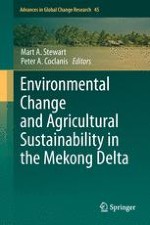2011 | OriginalPaper | Buchkapitel
7. Precarious Paddies: The Uncertain, Unstable, and Insecure Lives of Rice Farmers in the Mekong Delta
verfasst von : Peter A. Coclanis, Mart A. Stewart
Erschienen in: Environmental Change and Agricultural Sustainability in the Mekong Delta
Verlag: Springer Netherlands
Aktivieren Sie unsere intelligente Suche, um passende Fachinhalte oder Patente zu finden.
Wählen Sie Textabschnitte aus um mit Künstlicher Intelligenz passenden Patente zu finden. powered by
Markieren Sie Textabschnitte, um KI-gestützt weitere passende Inhalte zu finden. powered by
